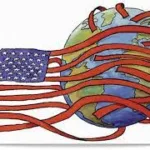Investing will drastically change if US Dollar is no longer the world’s reserve currency

If you’ve been investing your savings for the past 15 years, there is a situation you’ve hardly ever encountered: the U.S. dollar getting structurally weaker. While it’s not a given that this will be our new reality, it could one day be.
Wall Street was caught off guard when the US Dollar dropped against major currencies following this past week’s tariff news. Markets feared that protectionism could put an end to the U.S.’s economic dominance since the global financial crisis.
International money managers, who had massively biased their holdings toward U.S. assets, are feeling the urge to find another source of high returns. American investors, long comfortable ignoring foreign stocks, may no longer have that luxury.
“We are working on the assumption that in the next five years the dollar is going to lose another 10% to 15%,” said Luca Paolini, chief strategist at Switzerland’s Pictet Asset Management.
To be sure, asset managers in many cases are making short-term, defensive moves to protect against a potential recession. It also follows a trend of money leaving the “Magnificent Seven” stocks specifically—Apple, Microsoft, Amazon.com, Alphabet, Meta Platforms, Nvidia and Tesla—for reasons not fully related to Trump.
Americans who bought the rest of the S&P 500 15 years ago earned a total return of around 380%. Europeans who did the same, unhedged, earned about 490%—thanks to the dollar’s more than 20% gain against the euro, according to FactSet.
A stronger dollar should, mechanically, hurt U.S. stocks—by reducing the dollar value of overseas earnings—and help foreign ones. Historically, it has been better to buy the S&P 500 when the dollar was weakening. Over the past five years, that held true: Fed rate hikes strengthened the dollar while hurting equities.
But in the seven years before Covid-19, the dollar and U.S. equities moved in sync. That was the heyday of the “American exceptionalism trade,” when U.S. assets outperformed across the board—not just in tech.
A weaker dollar itself helps support the financial resilience of developing nations. Meanwhile, the European Union has rekindled investor hopes that it can close the growth gap with the U.S. through fiscal stimulus, industrial policy and energy independence.
This now leaves open the possibility that the manner in which investing is conducted will necessarily change drastically should the US Dollar ever be knocked off it’s perch at the top of the world.
It should be said that the US Dollar should stay the world’s reserve currency, because no other currency has been put forward as a serious alternative to the US Dollar. And talk about the decline of the US Dollar as the world’s reserve currency has gone on for decades.
But at the same time, if President Trump goes too far with his tariffs, many nations could seriously look into an alternative reserve currency, as a way to shield themselves from the US’ use of its financial and economic might to harm or bend a nation to its will. We will have to see what happens.


